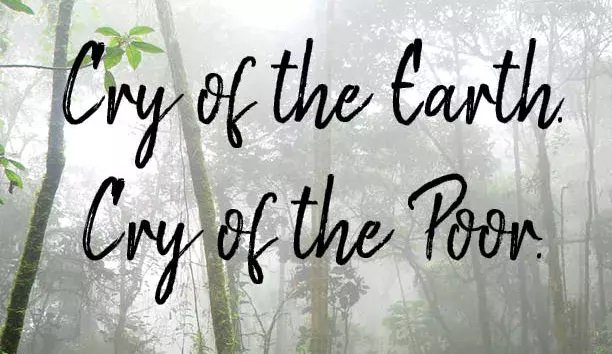FSPA: doing ‘what is ours to do through integral ecology’

Our pope and our Franciscan tradition call us to act upon these articulations of Earth’s imperious need.
What is the context of this crisis? How should we respond? What is ours to do?
In 2015, Pope Francis wrote a letter to address “care for our common home,” his ecological encyclical, Laudato Si. “It is Pope Francis’ call to conversion regarding our relationship with the environment, or our eco-conversion,” explains Franciscan Sister of Perpetual Adoration Eileen McKenzie. Integral ecology, she elaborates, is an essential element of such relational transfiguration — a way of being “rooted in the Franciscan understanding that all of creation is intimately related as brothers and sisters in Christ. As such, the suffering of humanity cannot be separated from the suffering of our environment, and vice versa.” Cry of the Earth. Cry of the poor. The focus of the 2019 Amazon synod.
Integral ecology is the science of such spirituality. “One way to interpret integral ecology is to say that we are all connected by the air we breathe, the water we drink and the land we walk on,” says FSPA Integral Ecology Director Beth Piggush. “In scientific terms, we can use the Law of Conservation of Matter that says matter cannot be created nor destroyed. The total amount of mass and energy in the universe remains constant. If you think about it, each molecule for water, land, or air can be found anywhere on Earth. This connects the United States to Africa, urban to rural communities, St. Rose Convent to FSPA land on St. Joseph Ridge in La Crosse, Wisconsin.”
Integral ecology is also a model for a just society. Sister Eileen illustrates: “An industrial factory, located next to a river in a small town, might take advantage of lacking regulation and dispose of its waste in a way that pollutes the water, impacting aquatic life and the people who live and fish downstream. The same people who are suffering from the polluted water may earn their living by working in the factory, which may drive the economy in the entire town.” There is no simple solution to this problem. “Integral ecology recognizes that our interrelatedness is complex and calls forth a response to the suffering in our world by integrating social, economic and environmental approaches to justice.”
Integral ecology has been and continues to be action for FSPA mission locally, regionally and globally. Ecological advocacy includes creation of the congregation’s integral ecology department, community learning and outreach opportunity on the land and in the organic garden, greenhouse and orchard at Villa St. Joseph, eco-spiritual offerings at our spirituality centers and collaboration within a network of international environmental action organizations. Momentum has been building, says Beth, “specifically within the Catholic Church.”
Ultimately, FSPA is answering the cries of the Earth and the cries of the poor, that all were called to thousands of years ago. “It is said that at the end of St. Francis’ life, he would tell the friars: ‘Let us begin again, brothers, for up until now, we have done little or nothing,’” shares Sister Eileen. “Our world is changing rapidly, calling forth integrated solutions to complex problems.” As FSPA, “we contemplate the beauty and suffering in our world and step into the new, challenging possibilities offered in Pope Francis’ call to eco-conversion. We, like Francis’ friars, begin yet again to do what is ours to do through integral ecology.”
FSPA’s mission of integral ecology and commitment to caring for all creation wraps around the world, due in part to connectivity with several international climate action groups and initiatives.
The Vatican:
FSPA looks to the Vatican’s Dicastery for Promoting Human Development, which promotes Pope Francis’ call for faith and integral human development in Laudato Si.
International Union of Superiors General:
FSPA is a member of the organization whose Justice, Peace and Integrity of Creation Commission collaborates with Global Catholic Climate Movement to create campaigns like Sowing Hope for the Planet, which provides action opportunities and coordination for programs like Global Tent, information about the Amazon synod and resources for the study of Laudato Si that include the new document “Laudato Si’ Roll-Out Plan for 2020 and Beyond.”
United Nations:
FSPA follows the United Nations’ Sustainable Development Goals, an overarching campaign to address all levels of care for creation, most importantly climate change, through a global perspective.
Global Catholic Climate Movement:
GCCM is an international network of Catholic individuals and organizations that supports Laudato Si’, offers the Live Laudato Si Pledge, encourages lifestyle changes through eco-congregation programs and publicly calls for climate policy change.
Catholic Climate Covenant:
Developed to address growing ecological awareness and the need to implement Catholic social teachings on ecology, CCC — now implementing a focus on environmental justice — is supported by 18 national partners that include the United States Conference of Catholic Bishops.
